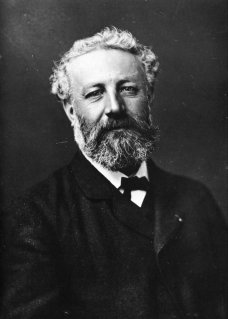The 11 years old Jules Verne enlisted as a cabin boy on a ship that would sail from Nantes, the city where he lived, to India. His father managed to get him back just on time. The still young Jules promised his father that he would only travel in his imagination from now on.
And he managed to keep his word. As a lawyer located in Paris, he wrote adventure stories that were based on current scientific discoveries. Later in his life, Verne earned eternal fame as author of Twenty Thousand Leagues Under the Sea (1870) and Around the World in Eighty Days (1873). But his first great success was his novel From the Earth to the Moon (1865). Verne's fantasy spaceship might look ridiculous to us now: a giant shell fired from a giant canon that would kill its passengers under its pressure and would never be able to escape the air resistance or gravity of the earth. Not to forget to mention that the journey back to earth, in which the shell would travel 185,000 km/h through the atmosphere, is impossible.
Still, the scientific data Verne based his works on was often correct. He knew that a spaceship would need an incredible high speed and a certain acceleration to overcome the gravity of the Earth, even though the velocity he says - 16,500 meters per second - is exaggerated. Verne also applied thrusters on his spaceship, who had to steer the ship in orbit around the Moon and make a journey back to Earth possible. He concluded justly that these thrusters would function in the vacuum of outer space. All kinds of details like this gave his novels a pseudo-scientific allure.
His enormous popularity caused a great amount of interest among those who believed in space travel and that it was a possible concept that would become true in the future. The same believe laid the basic foundations for the research and works of scientists who would in the decades following try to make Verne's dreams come true.

novelist, poet, and playwright
1828 - 1905
Hi! I am a content-detection robot. I found similar content that readers might be interested in:
http://yaooke.com/2016/06/09/the-visions-of-jules-verne/
Downvoting a post can decrease pending rewards and make it less visible. Common reasons:
Submit
Didn't Melies base his Trip to the Moon on Verne?
Downvoting a post can decrease pending rewards and make it less visible. Common reasons:
Submit